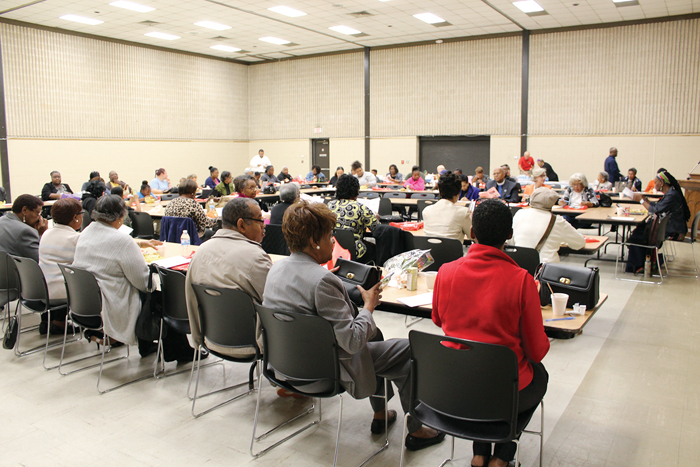Community organizations unite for free, informative conference
Published 12:10 am Monday, October 23, 2017

- Andie Foley / Salisbury Post - Over 130 attend Saturday's Intergenerational Financial and Lifestyle Empowerment Conference. The conference focused on financial health and employability.
While the topics of Saturday’s Intergenerational Financial and Lifestyle Empowerment Conference may have seemed daunting, presenting organizations kept the mood light and informative.
The conference was a collaboration between AARP, FACT, Wells Fargo, Livingstone College, Hood Theological Seminary and the City of Salisbury.
Over 130 were in attendance, learning ways to improve their financial health and employability, regardless of age or circumstance.
This free event was held at the Salisbury Civic Center from 9:30 a.m. until 2 p.m. Participants were provided a light breakfast, mid-session snack and boxed lunch, all while learning invaluable information.
Presentation topics included ways to improve credit and reduce debt, methods to pursue homeownership and tactics for success in today’s digitally-driven job market.
Rev. Dr. Derrick R. Anderson, presiding pastor at Soldiers Memorial AME Zion Church, opened the program.
“Everything we do has some effect on us . . .” Anderson said, “But one thing is certain: if you have good information and you do things that will bring about a blessing to your life and set your life in the future for good things, then you will reap the benefit of that.”
Acting on this statement was Salisbury mayor, Karen Alexander. Alexander donated $10 for a new savings account to the first 50 children and youth in attendance.
“I hope this is only the beginning, because I intend to do this every year,” said Alexander. “I think this is a very important program to encourage our children . . . because only a few dollars saved at that age can turn into hundreds of thousands and even millions in the future as they add to it.”
On understanding and managing credit
Following breakfast and opening remarks, children ages six to 17 were taken for a special presentation from Wells Fargo regarding the value of money and importance of saving. Leo Scarpati, AARP associate director of community outreach, gave insight into understanding and managing credit for adults during this time.
Scarpati’s talk included several credit best practices, such as knowing the difference between good debt (mortgages and car loans, credit lines that build assets or purchase items that increase in value) and bad debt (loans with high-interest rates, such as store credit cards and cash advances).
He also encouraged audience members to be more proactive as they open lines of credit, to know the terms and conditions and to shop for the best rate.
“You are a client and this is a business,” he said. “Make sure you claim that power of ‘I can take my business elsewhere.’”
On buying a home
Chanaka V. Yatawara, executive director of Salisbury Community Development Corporation, spoke on the programs available through his organization.
Salisbury Community Development Corporation, an HUD-certified housing counseling agency, helps qualifying individuals with down payment assistance, homeownership classes, renovations and foreclosure prevention.
This agency also purchases properties in disrepair, renovating or building new structures to revitalize Salisbury neighborhoods.
“Our goal is really to see the value of this neighborhood go up,” Yatawara said. “I live in Salisbury. You all live in Salisbury. We want to see Salisbury prosper.”
Chris Creswell, a home mortgage consultant with Wells Fargo, spoke to those ready to pursue a home loan, dispelling some myths and frequent deterrents for potential first-time buyers.
People can purchase a home with as little as zero to three percent down, Creswell said. For those who take a homebuyer education class, such as the one offered through Salisbury Community Development Corporation, Wells Fargo will contribute $750 toward closing costs.
“In the United States, the average homeowner has a net worth of over $200,000,” Creswell said. “A person who does not own a home has an average net worth of right under $5,000. You can tell the difference between how much it means if you own a home.”
On employability
Saturday’s group information sessions ended with presentations from area colleges — Rowan-Cabarrus Community College and Livingstone College — and Sandy Cross, a Charlotte-Mecklenburg resident with over 30 years of experience in human resources.
Cross spoke on practices employed by today’s hiring professionals, who now screen applicants through computer search engines rather than man-powered scrutiny.
The key to getting one’s application seen, Cross said, is to word relevant work experience exactly as it appears within a job listing. This includes knowing current and ever-changing, industry-specific vernacular.
“You’ve got to figure out how to frame your resumé in such a way that everything matches what they’re looking for . . .” she said, stressing, “The digital age that we’re talking about here has everything to do with your preparation before you get into writing your resumé and going to job fairs.”




